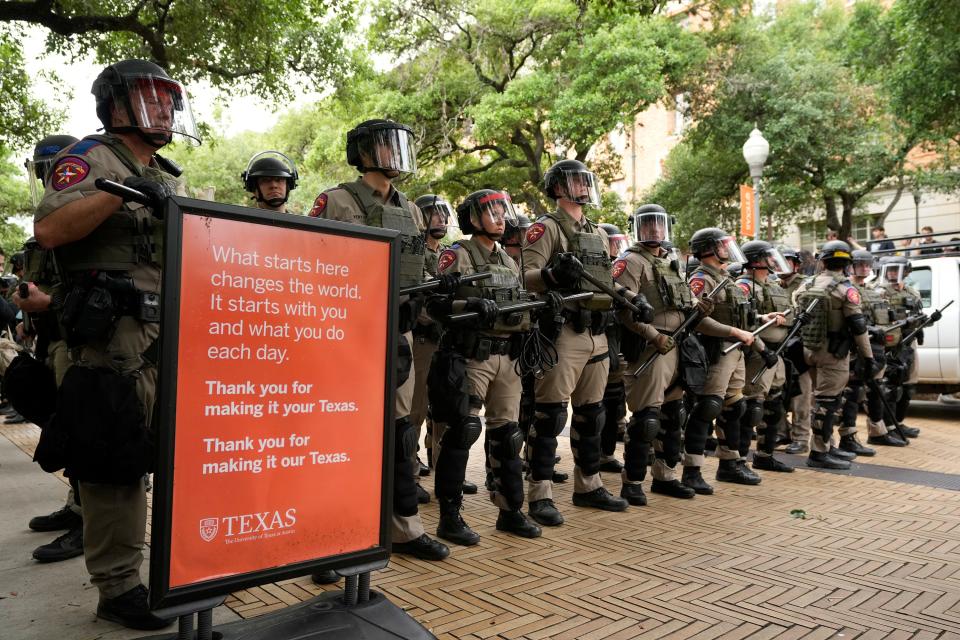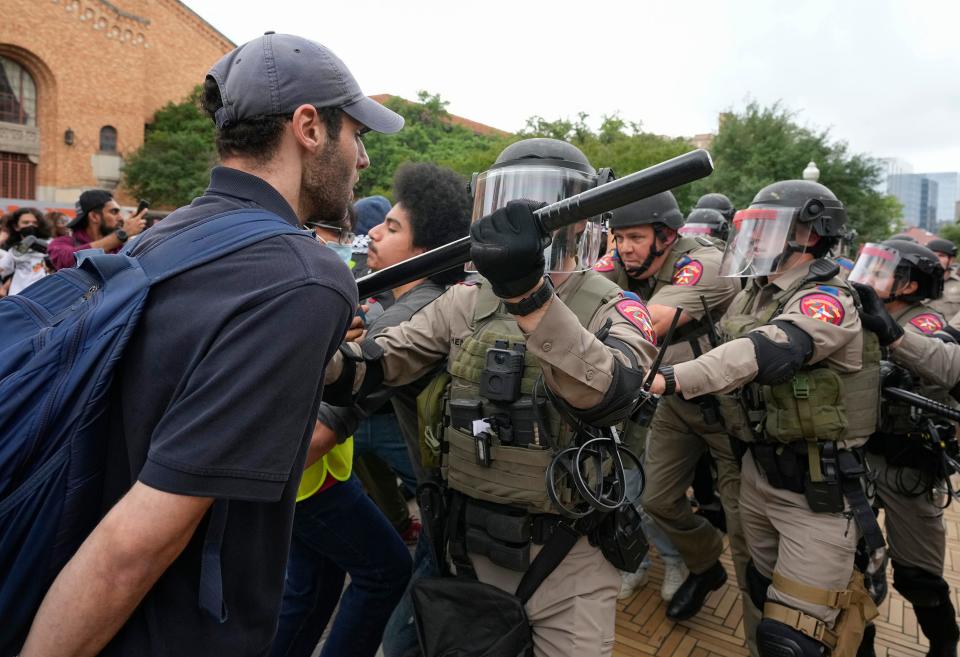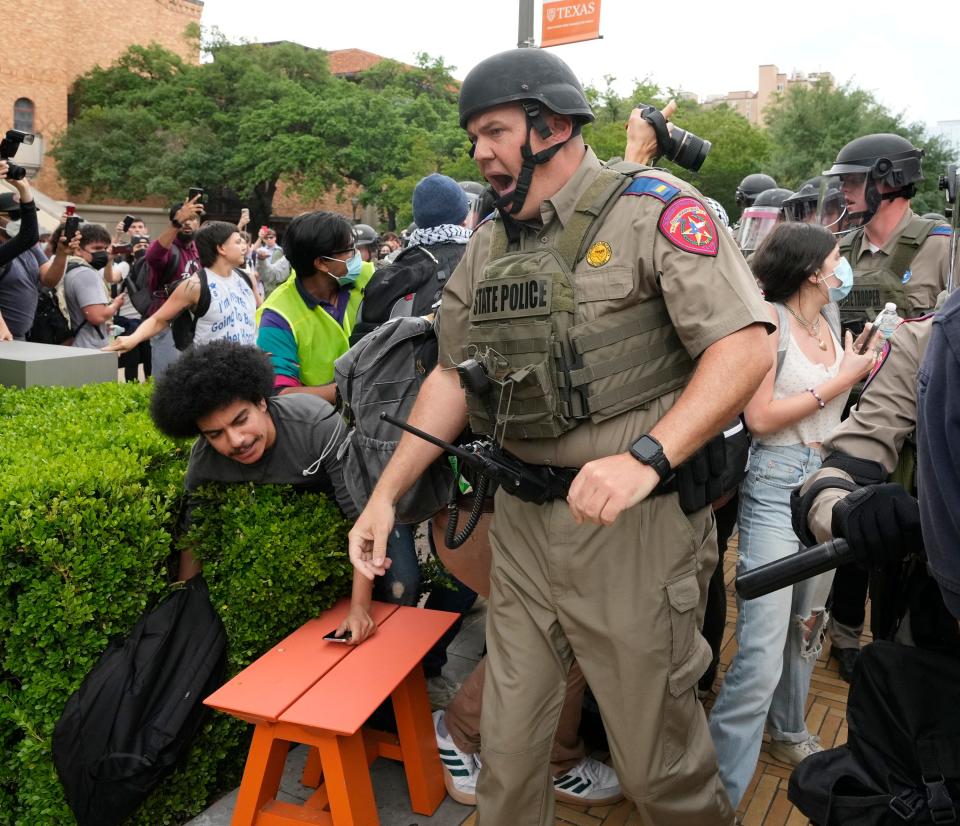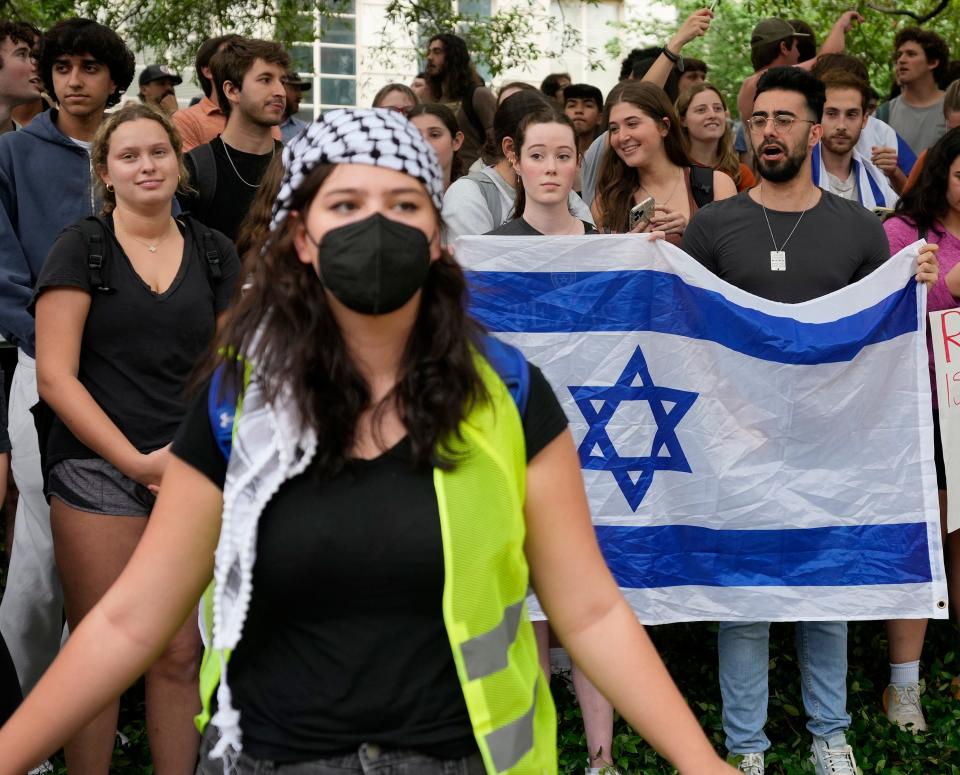'We asked for help': Text messages reveal why DPS was called to help patrol UT protest
- Oops!Something went wrong.Please try again later.
- Oops!Something went wrong.Please try again later.
University of Texas President Jay Hartzell told a state lawmaker that he and other officials sought law enforcement help from the state ahead of a large pro-Palestinian protest Wednesday that led to more than 50 arrests because “our police force couldn’t do it alone,” according to text messages obtained by the American-Statesman.
Hours after the Texas Department of Public Safety marched to the UT campus with rifles and riot gear to disperse the crowd assembled near the UT Tower, state Sen. Sarah Eckhardt, D-Austin, sent a message to Hartzell and UT System Chancellor J.B. Milliken questioning the law enforcement response.
“It appears the state is treating UT Austin differently than other campuses,” Eckhardt wrote at 6:07 p.m. Wednesday, according to the message, obtained under the Texas Public Information Act. “I’ve not seen reports of DPS in tactical gear sent to other campuses. Did UT Austin ask for this heightened presence?”
Hartzell responded more than an hour later: “We asked for help, Senator. They indicated their desire to mimic what happened at Columbia and elsewhere, which we are doing our best to avoid for obvious reasons.

“I can’t speak to the other campuses, but this group is a chapter of a national organization that has done this elsewhere. They clearly intended to break our protest rules, despite our statements to them that we couldn’t allow them to do so. I wish we weren’t in this situation.”
Milliken added that about 75 DPS troopers were deployed Wednesday to UT-San Antonio but that “the protest was small.”
Milliken said he was on the Austin campus to speak to a class, and “I was pleased with the leadership of UT police under the circumstances. They could not have managed a crowd of this size alone, however.”
Mike Rosen, a UT spokesman, told the Statesman late Thursday that the request to the DPS was a “joint decision between President Hartzell and his leadership team as well as (UT System) Chairman (Kevin) Eltife.”
Experts, faculty members skeptical of DPS involvement
Law enforcement’s dispersal of thousands of protesters at UT earned Hartzell the approbation of Republican pundits and politicians across the country along with solidarity from Gov. Greg Abbott.

“This is how it’s done,” state Rep. Craig Goldman, a Fort Worth native running for a seat in Congress, wrote in a social media post quoting Hartzell’s letter to UT about the university's response to the protest. “Thank you @JCHartzell.”
But the move to call in hundreds of campus, city and state police officers on foot and on horseback — and the widely publicized mass arrest — has also set into motion a highly publicized backlash against UT’s president.
At a rally Thursday at UT, multiple faculty members and students called for Hartzell to resign. Members of the UT chapter of the American Association of University Professors also began collecting signatures Thursday afternoon for a letter stating faculty members have "no confidence" in Hartzell.
More: Faculty, students at protest call for UT President Hartzell to resign after police response
In the letter obtained by the Statesman, five AAUP members wrote that “dozens of students were arrested for assembling peacefully on their own campus” and that Hartzell “needlessly put students, staff and faculty in danger” and “violated our trust.”
First Amendment experts, including some on UT’s faculty, have also expressed skepticism about Hartzell’s claims that the university upheld demonstrators’ constitutional rights — and some have rejected the notion entirely.
Amy Sanders, a UT law and journalism professor who teaches “Global Protections for Speech, Press & Protest," told the Statesman that she hadn’t yet seen any legal justification for the DPS troopers' actions at the demonstration.
She cited a policy at the school that builds off of a Texas law that Abbott signed into law in 2019 that designates outdoor spaces at all Texas public universities as traditional public forums, which are public spaces with the highest level of speech protections.
“The university has a policy that explicitly opens up outdoor public spaces for freedom of speech for expressive activity,” Sanders said. “A desire to shut down a peaceful protest not only violates the First Amendment, it also goes against UT’s stated policies.”
Steven T. Collis, a UT professor who specializes in First Amendment law, told the Statesman there isn't enough public evidence available to prove whether the protest response infringed on students' constitutional rights. He urged people to wait until more information is available before making a judgment.
Civil rights advocacy groups have condemned the university's decision to call in the DPS. An attorney representing the Foundation for Individual Rights and Expression told the Statesman the police response was plainly unconstitutional.

“It's one thing to have law enforcement prepared to respond to disruption, but this was a phalanx of police shutting down protected expression in the open areas of campus that Texas law says is open to protest,” Adam Steinbaugh, a FIRE attorney, wrote in an email. “That violated the First Amendment.”
The Texas chapter of the American Civil Liberties Union is investigating the incident, an attorney for the advocacy group told the Statesman.
“The default is that people have a right to peacefully assemble and protest,” ACLU attorney Brian Klosterboer said. “Only in extreme circumstances where there is a real threat to public safety, or some other compelling governmental interest, can the police arrest people for simply being there (and) protesting.”
In a statement to campus community members in the aftermath of the arrests, Hartzell justified the police presence by saying that the Palestine Solidarity Committee, the registered student group that planned the protest, stated that it intended to violate campus rules.
He cited the group’s encouragement in a social media post for students to wear masks, which is against UT’s policy for protesting on campus. He added that “many (protesters) ignored University officials’ continual pleas for restraint and to immediately disperse.”

“Today, our University held firm, enforcing our rules while protecting the Constitutional right to free speech,” Hartzell wrote in his Wednesday night letter. “Our rules matter, and they will be enforced.”
How the episode will affect the university in the long term remains to be seen.
Sanders worries the police response to the protest creates a "chilling effect" on campus speech.
“The idea that students could be arrested or could be put in jail actively discourages them from exercising their First Amendment rights," she said. "And that's antithetical to what we teach them at a public university.”
Statesman staff writer Lily Kepner contributed to this report.
This article originally appeared on Austin American-Statesman: Austin protest: Texts reveal why UT president called in for DPS help

